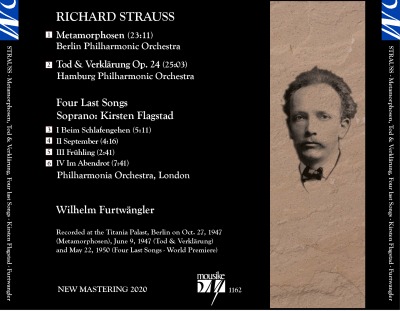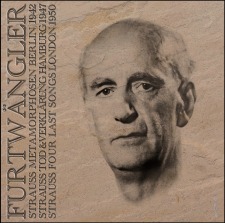The first of these Strauss works is a great and interesting work. Composed in the last days of the war, I believe it expresses Strauss’ necessity to make sense of the destruction of German culture. It is significant that he uses quotes from the Funeral March of Beethoven’s Eroica, as well as another reference that could represent the famous four note theme of the Fifth. Could these quotes represent a kind of reaffirmation of that German culture that has been destroyed? Metamorphosen is a very tragic work and Furtwängler is the ideal conductor for it, especially having gone through an experience similar to the composer. Furtwängler was always a very sympathetic interpreter of Strauss, conducting his works many times. That is why I included a live recording of Tod & Verklärung (Death & Transfiguration). This work is analogous to Metamorphosen in contour, both works starting out in a slow tempo, having a faster central section, and then going back to a slower tempo for the last part. Tod & Verklärung is a tragic work as well, but from the more optimistic early period of his life.
Finally, we have Strauss’ Four Last Songs, his last major work. This recording comes from the World Premiere in London’s Albert Hall with the Philharmonia Orchestra and the magnificent Kirsten Flagstad. The composer had wanted her to sing the premiere. Flagstad and Furtwängler left many extraordinary recordings, including the famous 1952 Tristan and a Ring cycle in La Scala performed the same year as these songs. I think it is glorious, although the sound quality is problematic. I have tried to do my best, but it is still not very good.
Finally, we have Strauss’ Four Last Songs, his last major work. This recording comes from the World Premiere in London’s Albert Hall with the Philharmonia Orchestra and the magnificent Kirsten Flagstad. The composer had wanted her to sing the premiere. Flagstad and Furtwängler left many extraordinary recordings, including the famous 1952 Tristan and a Ring cycle in La Scala performed the same year as these songs. I think it is glorious, although the sound quality is problematic. I have tried to do my best, but it is still not very good.
 |
